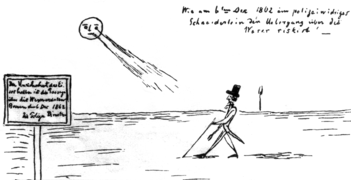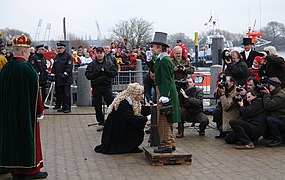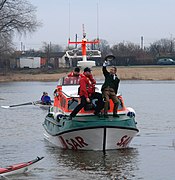Bremen ice bet
The Eiswette ( Low German Ieswett ) is a traditional betting - ceremony in Bremen , held annually on January 6, the Epiphany , impact 12pm on Osterdeich at the Weser takes place, namely the former punk dike near the Sielwall . The custom originated in 1828, was first practiced in 1829 and henceforth on New Year's Day and, from 1928 until today, on Epiphany. It's about the bet of de Werser wins or stands ( Low German for 'whether the Weser goes or stands'). This public ice contest rehearsal and a subsequent internal ice contest , which takes place on the third Saturday in January, are organized by the (unregistered) Eiswette von 1829 association.
history
Following the example of English gentlemen's clubs , the sociable merchant circles of Bremen liked to bet on all sorts of things. At one of these meetings on November 8, 1828, 18 gentlemen (including 13 merchants) bet whether the Weser would be open or frozen on January 1. The prize was a communal meal of cabbage . Since then, the ice cream bet has been repeated almost annually and redeemed with a celebratory meal accompanied by a game of cards, pleasant speeches and amusements. From 1851 people dined in the club rooms of the Union von 1801 , a club of young merchants, from 1881 in the rooms of the Gesellschaft Museum , after 1912 in Hillmanns Hotel and from 1929 mostly in the " Glocke ". From 1862 onwards, guests from outside also took part more often.
Since 1883, the year in which the realization of the of Ludwig Franzius begun Weser correction should set in, and the Weser only rarely freeze, the betting output was caused by lot. By the turn of the century, the number of ice cream contenders had grown to around 90.
In the anniversary year of 1928, the custom arose of practicing the “rehearsal” on Easter dike, which is still common today, on Epiphany (January 6th) at 12 noon by a 99 pound “tailor” with a hot iron. Further participants in the ceremony are the kings from the Orient as well as the Notarius publicus , the Medicus publicus , the president of the ice bet, the ice bet presidium and the novices. The main actors appear in historical costumes. The texts for the tailor and his colleagues have been written by the North German author Jürgen Kropp since 1994 . The tailor plays the role of a lovable mocker who pokes fun at the social and political events of the previous year.
Another tradition-building innovation was also established at the ice competition in 1928: The collection of donations for the benefit of the German Society for the Rescue of Shipwrecked People (DGzRS), which started modestly and grew steadily in the following years.
The "civil, very private and completely unmilitary society" for many years came closer to a national-conservative orientation in the years before and after the First World War . Senators and senior members of the military were invited, the speeches became more political, the band of the Bremen Reichswehr Battalion played, celebrities from Stahlhelm and Freikorps appeared as speakers hostile to the republic. After 1933, the National Socialists used the ice bet as a forum for influencing the merchants - without their resistance; rather, the number of participants increased to around 500 by 1939. The ice bet had become a Nazi-compliant event.
In 1949 the festival took place in the town hall, and in 1952 for the first time again in the "Glocke". The traditions maintained to this day include the ice competition test in the form described, expanded by the fact that the tailor then crosses the Weser on the daughter boat of a DGzRS rescue cruiser . Elements of the current Eiswettfeste are each in addition to a number of other regulations , the coal-and-pee -Eat at large round tables ( "ice"), a commonly held by a special guest speech at Bremen and Germany, cabaret deposits and fund-raising for the GMRS. In 2012, 400,000 euros were raised, in 2020 it was around 480,000 euros.
A rescue cruiser of the DGzRS (which is based in Bremen) was named Eiswette (built in 1980). After it was decommissioned at the end of 2008, the Eiswette 2009 saw another rescue cruiser named Eiswette (built in 2008).
Eiswette has been legally protected as a word mark since 2007 .
The Eiswette association from 1829
Club structure
The Eiswettverein, which operates under the name Eiswette von 1829 , has legal capacity, but is not a registered association and does not require accounting. The process of self-completion of their membership is not publicly known. Because of the corporate purpose of collecting donations for the DGzRS, the ice betting association is recognized as a non-profit organization.

In addition to the public Eiswettprobe on Osterdeich the Eiswettverein shall address the internal and not public Eiswettfest out. It is traditionally always held on the third Saturday in January and now takes place regularly in the Congress Centrum Bremen (CCB). The traditional event now has around 800 - until 2019 exclusively male - participants, including many invited, some also from outside Germany, from business and society. Traditionally, the incumbent mayor of Bremen is always invited.
From the very beginning to the present day women were not allowed to join the club or take part in the ice cream festival, which has led to increasing criticism since the 2000s. In June 2013, the state parliament, the Bremen citizenship , passed a demand with a clear majority to allow women in the future. The media are also largely excluded from the ice competition. The ice betting cooperative was described as an institution characterized by an elitist self-image and concerned with exclusivity.
Criticism and controversy
In January 2019 there was a scandal because of the exclusion of women . The ice cream competition president Patrick Wendisch , who has been in office since 2013, attracted public attention when he insisted on "the tradition" of the ice cream club and invited the mayor of Bremerhaven, Melf Grantz, to the 2019 ice cream bet foundation festival instead of Bremen's mayor Karoline Linnert . Mayor Carsten Sieling was unable to attend the memorial service for Gdansk's mayor Paweł Adamowicz and had therefore asked Wendisch beforehand to invite his deputy Linnert to the ice cream festival as the official representative of Bremen. However, the ice competition president insisted on the association's statutes and justified the exclusion of women:
“We are a men's club, we don't go along with this gender gaga. Even the Pope would not be invited if he were a woman. "
The "non-invitation" became a nationwide topic in the mass media . The attitude of Eiswettpräsident Wendisch and the ice betting club represented by him as “misogynistic and antiquarian” led to considerable criticism in politics, the public, the media and social networks. The ice cream club and its president were accused of sexism . Interior Senator Ulrich Mäurer canceled his participation in the ice competition at short notice.
In March 2019, the Bremen citizenship decided that “male members of the Bremen citizenship, the Senate and the administration” should “no longer attend events where women are not allowed”. The motion submitted by the SPD and the Greens within the framework of women's and gender equality policy and passed by the citizens with their majority votes (at that time) referred primarily to the ice betting club's criticized invitation practice. According to the (resolved) application, this requirement should apply until the “Bremen ice bet removes the exclusion of women as representatives of Bremen”.
In October 2019, the ice competition bowed to public and political pressure and announced that women will be able to participate in the event in the future. For example, women would be invited as guests at the 2020 Ice Cream Festival, but in future they can also become “comrades” and then invite guests themselves. At the beginning of January 2020, the egg betting association announced the participation of around 30 women in the upcoming ice competition. Meanwhile, neither the mayor of Bremen nor other members of the Bremen Senate nor representatives of the press were invited to and admitted to the 2020 ice cream festival. The “non-invitation” of Bremen's politicians was the reaction of the ice competition presidium to the citizenship decision of March 2019, according to the ice competition president Wendisch. In the media and in public, the “ return coach ” once again led to criticism of the attitude of the ice competition committee as “an affront that is unusual for Bremen ”.
For the first time in around 190 years, around 770 men and 30 women took part in the ice competition on January 18, 2020. Nevertheless, the ice betting club continues to be criticized; In addition to the exclusion of Bremen Senate members and the press, the current quota of women of only around four percent ( buten un inside : " marginal note ") has been criticized, for example by the Bremen state women's representative, Bettina Wilhelm : "The gentlemen are from the day before yesterday - and much too late . "
President of the Bremer Eiswettverein
|
|
|
Imitators
More recently, the Bremer Eiswette has found imitators on other waters:
- Since 1976, an “ice bet” has been held in Clüversborstel (municipality of Reeßum ) every year between Christmas and New Year, in which it is a question of whether the Wieste will win or rise. At the event organized by the Clüversborsteler Kulturverein, a selected local resident walks “over the ice” or through the small river.
- Since 1997 an “ice bet” has been held in Braunschweig on a branch of the Oker . Even though the water is knee-high, there are lifeguards from the DLRG on site.
- Since 1998, an “ice bet” has been held in Hage every year in January to determine whether the mayor of Hage can cross the moat of Berum Castle with dry feet .
- The “Schilsker Eiswette”, launched in 1999 on the Obersee in Bielefeld - Schildesche , was held for the 14th time at the beginning of February 2012.
- Since 2001 there has been an "ice bet" on the Dümmer every year on the first Sunday in January .
- On February 21, 2009, the Wolfenbütteler Eiswette was held for the first time on the Stadtgraben.
literature
- Karl Löbe : Ice bet from 1829 in Bremen . 2nd, revised edition. Döll, Bremen 1998, ISBN 3-88808-243-9 (written in columns, but rich in facts. The 1st edition was published in 1979 under the title: 150 years of ice betting from 1829 in Bremen ).
- Rüdiger Hoffmann (Ed.): 175 years of ice betting from 1829 in Bremen . Edited by Bremer Landesbank Kreditanstalt Oldenburg - Girozentrale - . Bremer Landesbank Kreditanstalt Oldenburg - Girozentrale -, Bremen 2004, DNB 973422998 .
- Arndt Frommann: The ice bet of 1829 in Bremen between the world wars. From the Biedermeier to the main and state action . In: H-Soz-Kult (Ed.): Workers' Movement and Social History . No. 26 , 2012, ISSN 1436-3763 , p. 79-114 .
Web links
- Website of the Eiswette association from 1829
- Radio Bremen : Die Bremer Eiswette ( Memento from February 27, 2005 in the Internet Archive )
- Arndt Fromman: The history of the Bremen ice cream bet , 2017
Individual evidence
- ↑ history. In: eiswette.de. Eiswette von 1829, accessed July 24, 2017 .
- ^ Herbert Black Forest : The Great Bremen Lexicon . Volume 1: A-K. 2nd, updated, revised and expanded edition. Edition Temmen, Bremen 2003, ISBN 3-86108-693-X , p. 226.
- ↑ The appearance of the tailor has only been mentioned very sporadically (1863, 1868, 1869).
- ↑ a b c (kuz / dpa): Further criticism of the ice cream bet / record donation. Four percent. In: Kreiszeitung.de . January 19, 2020, accessed January 19, 2020 .
- ↑ Arndt Frommann, 2012, p. 112, note 5.
- ↑ a b Arndt Frommann, 2012.
- ↑ a b c Jürgen Hinrichs: Eiswette is making waves. In: weser-kurier.de . January 22, 2019, accessed January 23, 2019 .
- ↑ Radio Bremen archive link ( Memento from October 2, 2013 in the Internet Archive )
- ↑ a b Jan Zier: Bremen men's club causes a scandal: unloaded ice cold. In: taz.de . January 22, 2019, accessed January 23, 2019 .
- ↑ Alexander Mertens: Linnert booted out at ice competition: No more gender gaga! In: Bild.de . January 19, 2019, accessed January 23, 2019 .
- ^ Patrick Reichelt: Conflict in the Hanseatic City: Women not wanted. In: tagesspiegel.de . January 21, 2019, accessed January 23, 2019 .
- ↑ Karl-Henry Lahmann: Ice Festival without Mayoress: Something from yesterday. In: butenunbinnen.de . January 18, 2019, accessed January 23, 2019 (comment).
- ↑ (flr / dpa): Ice competition in Bremen: Mayor Linnert is not allowed to come. In: Focus Online . January 20, 2019, accessed January 23, 2019 .
- ↑ (koe): Bremen: Because she is a woman - the mayor is not allowed to the fundraising gala. In: Spiegel Online . January 20, 2019, accessed January 23, 2019 .
- ↑ Sophie Labitzke, Jens Fabig: Ice cream festival without women - Sieling is also outraged. In: butenunbinnen.de . January 21, 2019, accessed January 23, 2019 .
- ↑ (dpa / hof): "Eiswettfest": Mayor Linnert unloaded - because she is a woman. In: welt.de . January 21, 2019, accessed January 23, 2019 .
- ↑ Eiswettfest in the criticism: Sexism accusation against Bremen men's group. In: nwzonline.de . January 22, 2019, accessed January 23, 2019 .
- ↑ Lisa-Maria Röhling: Senators should boycott ice cream festival. In: weser-kurier.de . March 28, 2019, accessed January 5, 2020 .
- ↑ (dpa / lni): The traditional ice betting event opens up to women. In: welt.de . October 23, 2019, accessed January 4, 2020 .
- ↑ (epd): Traditional event Bremer Eiswette in future also with women. In: evangelisch.de . October 23, 2019, accessed January 4, 2020 .
- ↑ (dpa): A spectacle with a long tradition: Does the Weser flow? In: noz.de . January 5, 2020, accessed January 5, 2020 .
- ↑ a b Silke Hellwig, Nina Willborn: Ice competition without the Bremen Senate. In: weser-kurier.de . January 3, 2020, accessed January 6, 2020 .
- ↑ (dpa / lni): For the first time, no Bremen Senate member at the ice competition. In: sueddeutsche.de . January 3, 2020, accessed January 6, 2020 .
- ↑ a b Eckhard Stengel: Bremer Eiswette. Testosterone-powered return coach: when men lose their roles. In: fr.de . January 5, 2020, accessed January 7, 2020 .
- ↑ Silke Hellwig: A long nose for Bremen's Senate. In: weser-kurier.de . January 5, 2020, accessed on January 19, 2020 (comment about the ice bet).
- ↑ Lotta Drügemöller: Bremen ice cream festival without politics: women? O. K. Senate? No! In: taz.de . January 12, 2020, accessed January 19, 2020 .
- ↑ a b NDR 1 Lower Saxony : Ice competition in Bremen: women were there for the first time. In: ndr.de . January 19, 2020, accessed January 19, 2020 .
- ↑ Daniel Hoffmann: Bremer Eiswettfest 2020: damn femininity to marginal. In: butenunbinnen.de . January 18, 2020, accessed on January 20, 2020 (comment).
- ↑ Helen Hoffmann: Eiswette: No more pure men’s round in Bremen. In: nwzonline.de . January 20, 2020, accessed January 20, 2020 .
- ↑ (last): Sottrum: A new Schlobohm for the ice cream bet in Clüversborstel. In: Kreiszeitung.de . December 23, 2016, accessed January 3, 2019 .
- ↑ Katja Dartsch: Museum manager wins the ice bet . In: braunschweiger-zeitung.de , February 5, 2012
- ↑ Hager Eiswette 2006
- ^ Thomas Güntter, Barbara Franke: The picture book Obersee . In: nw-news.de , February 6, 2012
- ↑ 10 years Eiswette Dümmer See ( Memento from April 14, 2011 in the Internet Archive )
- ^ 1. Wolfenbütteler Eiswette ( Memento from April 30, 2010 in the Internet Archive )
Coordinates: 53 ° 4 ′ 7.2 ″ N , 8 ° 49 ′ 18.9 ″ E




